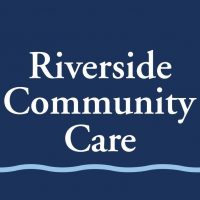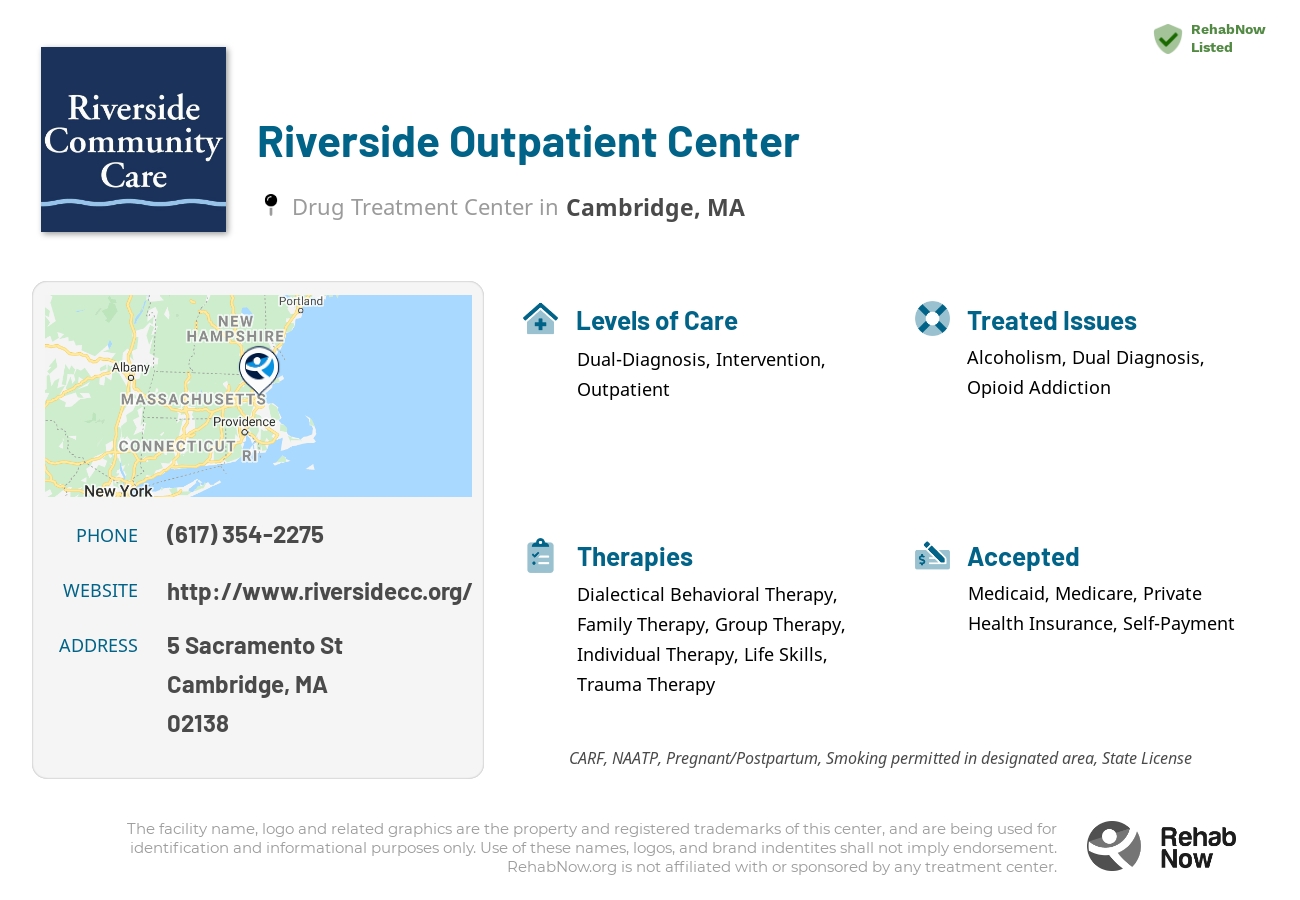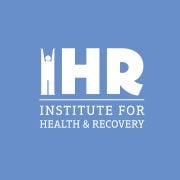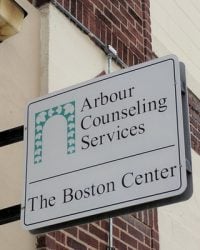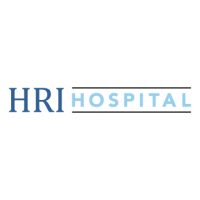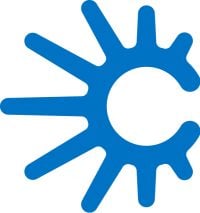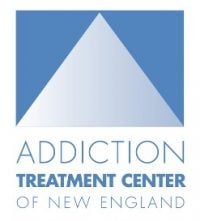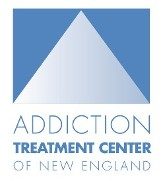Riverside Outpatient Center
Drug Rehab Center in Cambridge, Massachusetts
Riverside Outpatient Center is a private mental health and substance abuse treatment center in Cambridge, MA that provides comprehensive care including various therapies and treatment options for alcohol and opioid addiction, as well as dual diagnosis.
Multiple patients have reported Riverside Outpatient Center as permanently closed.
Research other rehabs in Cambridge, Massachusetts, or get help finding an open facility.
About Riverside Outpatient Center in Massachusetts
Riverside Outpatient Center in Cambridge, Massachusetts is a treatment facility dedicated to helping individuals struggling with alcoholism, dual diagnosis, and opioid addiction. They offer a range of services to support individuals seeking sobriety, including dual-diagnosis treatment, intervention services, and outpatient levels of care. The center is affiliated with Riverside Community Care, providing clients with access to a network of experienced professionals and resources. Riverside Outpatient Center is committed to assisting individuals on their journey to recovery by providing comprehensive treatment options tailored to each person's unique needs.
At Riverside Outpatient Center, individuals can expect to receive a variety of services and treatment methods to address addiction and substance abuse. The facility specializes in dual-diagnosis, recognizing the importance of treating both mental health and addiction issues simultaneously. Their intervention services help families and loved ones create a supportive environment for the individual seeking treatment. In terms of levels of care, Riverside Outpatient Center offers outpatient programs, allowing individuals to receive treatment while maintaining their daily routines. With the utilization of evidence-based approaches and a focus on individualized care, Riverside Outpatient Center provides a supportive and effective environment for those seeking recovery from alcoholism, dual diagnosis, and opioid addiction.
Genders
Ages
Modality
Additional
Conditions and Issues Treated
Opioid addiction has become a significant health problem in the United States. In 2015, there were 91 opioid overdose-related deaths per day, with a substantial increase in mortality rate in 2014.
When opioid addiction has reached a point where a person’s life becomes unmanageable, treatment options are available to help them get sober. Treatment that includes medical care with medications and counseling can help a user transition into sobriety.
When someone in struggles with both addiction and mental or emotional illness, this is considered a dual diagnosis. Dual diagnosis treatment can include therapy for these issues to happen simultaneously, which will allow either of them to be treated effectively.
Sometimes people who have suffered from addiction disorder also suffer from co-occurring disorders such as depression, anxiety, bipolar disorder, etc., making them “dual diagnoses.” Dual diagnoses require specialized treatment programs where drug and alcohol addiction are addressed along with psychiatric illnesses. Some rehabilitation facilities provide patients suffering from cooccurrences a program with highly integrated services and a clean environment with few distractions to help them succeed.
Levels of Care Offered
This center offers a variety of custom treatment tailored to individual recovery. Currently available are Dual-Diagnosis, Intervention, Outpatient, with additional therapies available as listed below.
Outpatient treatment is often used for drug addicts in drug rehab. Outpatient treatment consists of counseling and therapy sessions. This form of treatment is also called ‘day-treatment’. The outpatient treatment process begins with the addict’s initial detox period, lasting about ten days.
Outpatient treatment is used for those who are at moderate risk for ‘slipping back’ into the addiction, for those who:
- Are not currently experiencing any side effects from withdrawal and can handle social pressure
- Can handle stressors that might trigger relapse
- Have a stable living environment or have moved out of their previous environment, which was not conducive to being sober
- Have a support system that allows them to go to a facility a few times a week while still keeping their current responsibilities
- Have no legal obligations, being either on parole or probation, that require them to seek treatment at a mandatory facility
- Are not currently experiencing any side effects from withdrawal and can handle social pressure
- Have a stable living environment or have moved out of their previous environment, which was not conducive to being sober
Intervention Programs can be beneficial for those who are not prepared to engage in a recovery program. The individual’s friends and family will call and set up an intervention in or near Cambridge, and at which a specialist will come and lead the discussion. Interventions help family members motivate those affected to seek external support.
People involved in substance abuse usually deny the harmful effects of their changed behavior. They believe they can overcome addiction alone. This, however, can be difficult without external help. Intervention services deploy professionals to help organize meetings between individuals and family members. Family members converse openly with the affected individual and express concern for them. They explain different treatment options and persuade the individual to act immediately.
Therapies & Programs
Because no single treatment is effective for all addicts, the goal of treatment and therapy should be to figure out what works best for each individual. Tolerance and withdrawal levels differ from person to person, affecting the treatment intensity required. Addiction treatment should aim to help addicts develop healthy coping mechanisms for dealing with their addiction and its underlying causes.
Family therapy is beneficial for people who are in addiction treatment services because it offers addicts the opportunity to work with their family members to better understand what led them to make choices that contributed to their addiction.
This type of therapy helps family members reach a deeper understanding of how they can best support their loved one during recovery. It also helps the addict better understand their own motivations and triggers that led them to turn to substance abuse.
Family therapy can help addicts in the following ways:
- Assists family members in processing difficult feelings so they don’t blame or resent recovering addicts
- Assists family members in understanding how addiction has impacted the addict and everyone who is involved with them
- Allows the addict to take responsibility for their actions, while encouraging improved communication skills
- Helps family members understand how to best support an individual in recovery so addicts don’t relapse again.
Group therapy can help build a stronger support system and give addicts in Cambridge, MA insight into their addiction that they gain through shared conversations. Group therapy occurs in a controlled group environment, exclusive of one on one meetings. This makes it safer for patients to feel comfortable sharing the struggles they’re going through and gaining perspective.
Trauma therapy is beneficial for people who are recovering from drug addiction because it helps them heal from past traumas that may have caused them to turn to harmful substances or led them to experience negative emotions that contributed to their destructive behaviors.
This type of treatment works by processing difficult experiences so individuals can learn how to process these events without having to turn to substances for coping.
Trauma therapy can help addicts in the following ways:
- Helps individuals understand their experiences and emotional responses to difficult events, including why they turned to drugs or alcohol
- Provides them with comfort and support while working through difficult emotions related to these traumatic experiences
- Offers an opportunity for addicts to have a voice and be heard, which can improve their self-esteem
- Can help them develop coping skills so they can better respond to triggers instead of turning to substance abuse.
Dialectical Behavior Therapy (DBT) is a cognitive-behavioral therapy that helps patients understand the relationship between their thoughts, feelings, and behaviors. It is beneficial for those whose addictions and behaviors stem from severe mental health issues. The term “Dialectic” means the integration of opposites. In substance abuse, DBT refers to accepting the patient’s addiction and working to change their thoughts and behavior. It improves life skills such as controlling intense emotions without reacting impulsively, resolving interpersonal conflicts effectively, and promoting awareness about self and others.
Cognitive-behavioral therapy is a technique that is used to help people with addiction. Specifically, it is a way of identifying thoughts and behaviors that cause the addiction. It is typically used in an individual counseling session.
The content explains cognitive behavioral therapy and how it works to address some behaviors that may be leading to unintended consequences in their life, as well as its benefits for those seeking sobriety.
It works by helping people to talk through their issues and addressing the thoughts that cause said behaviors. It is an excellent way of learning about oneself and one’s perception of the world.
Life Skills Services assist addicts in their recovery by teaching them healthy coping mechanisms that will aid them in becoming sober, focussing on helping people enter into, and maintaining long-term sobriety. Drug Treatment Centers provide Life Skills Services at varying levels of intensity, specific to the needs and requirements of each patient.
The benefits of Life Skills Services offered at Riverside Outpatient Center:
- Restores hope and empowerment — Helps addicts believe that recovery is possible and instills a new confidence in their ability to achieve a positive, drug-free future
- Enhances family involvement — Encourages families to get involved in the recovery process and supports their understanding and encouragement of healthy behavior.
- Increases patient’s compliance — Helps patients take responsibility for and ownership of their recovery and encourages continued progress
- Reduces relapse rates — Encourages long-term abstinence and emphasizes the importance of establishing sober support systems.
Payment Options Accepted
For specific insurance or payment methods please contact us.
Is your insurance accepted?
Ask an expert, call (888) 674-0062
Riverside Community Care Associated Centers
Discover treatment facilities under the same provider.
- Riverside Community Care - Milford in Milford, MA
- Riverside Community Care - Needham in Needham, MA
- Riverside Community Partners BH CP - Connect2Recovery in Dedham, MA
- Riverside Life Skills Center in Somerville, MA
- Riverside Psychiatric Day Treatment in Wakefield, MA
Learn More About Riverside Community Care Centers
Additional Details
Specifics, location, and helpful extra information.
Cambridge, Massachusetts 2138 Phone Number(617) 354-2275 Meta DetailsUpdated November 25, 2023
Staff Verified
Riverside Outpatient Center Patient Reviews
There are no reviews yet. Be the first one to write one.
Cambridge, Massachusetts Addiction Information
Massachusetts has one of the highest rates of drug abuse in the country. More than half a million Massachusetts residents abuse alcohol while more than 1.5 million use illegal drugs each year. This drug and alcohol usage is the cause of over 8% of all deaths in the state. In 2017, Massachusetts ranked in the top 10 of the states with the highest opioid overdose rates.
The percentage of people who reported using drugs is significantly higher in Cambridge than in the rest of Massachusetts. 4% of teenagers reported using an illicit drug. About 5.5% of adults aged 18 or older reported using marijuana. The most commonly used drugs in Cambridge are marijuana and heroin. Out of many different types of rehab programs available in Cambridge, the most common type is an outpatient program,
Treatment in Nearby Cities
- Arlington, MA (3.0 mi.)
- Chelmsford, MA (19.6 mi.)
- Burlington, MA (9.3 mi.)
- Lincoln, MA (9.9 mi.)
- Cambridge, MA (0.8 mi.)
Centers near Riverside Outpatient Center
The facility name, logo and brand are the property and registered trademarks of Riverside Outpatient Center, and are being used for identification and informational purposes only. Use of these names, logos and brands shall not imply endorsement. RehabNow.org is not affiliated with or sponsored by Riverside Outpatient Center.
